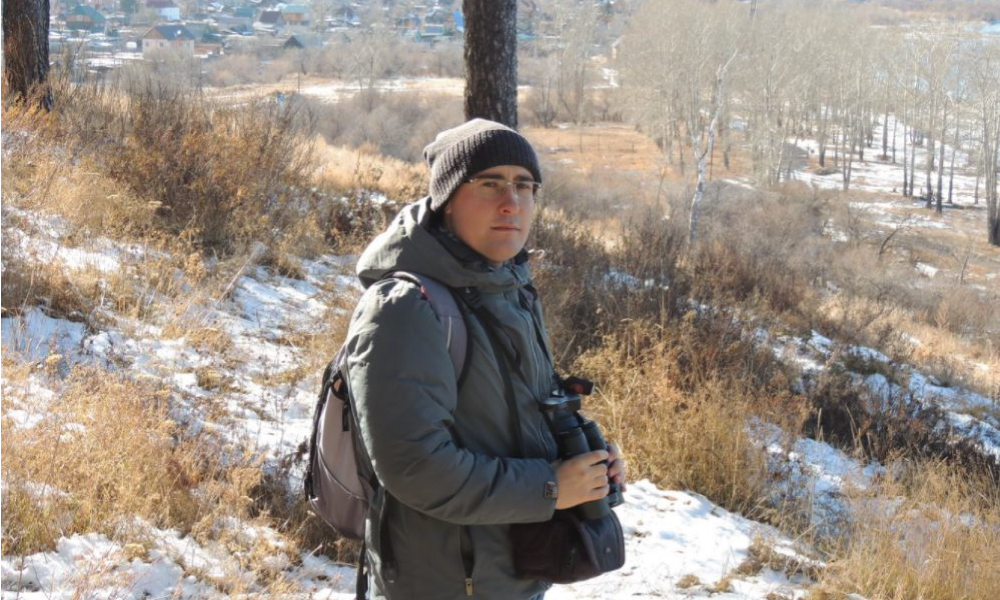Interview with Alexander Povarintsev, manager of the project «Monitoring for water birds in the southern part of Lake Baikal in the situation of long-lasting low-water period»

Alexander, when did the idea of this project come to you?
The idea has existed for a long time but there were no possibilities to look at the whole picture of semiaquatic and water birds in the river Selenga delta. Investigations on Baikal birds used to be regular but then they had to be shut down. Since then water birds research in our country is «bitty». This is the reason why my colleagues and I got interested once we learned about the competition.
What is the bottom line of the project? How exactly does it contribute to the protection of lake Baikal?
For each kind of natural resources use (recreation and birds observation certainly deal with the use of natural resources) it is needed to know how to do it and on what scale. Water fowl are connected with both water and terrestrial environment and may be indicators of some unusual processes in Baikal’s ecosystem. On the basis of obtained data it becomes possible to define effective protective measures in deltas and on the coast. The birds have a significant meaning for human either as fish consumers or as potential carrying agents. Among semiaquatic species we can find those from the Red List, endangered species which need to be treated carefully for their protection and preservation. In other words, the bottom line of the project is information about water fowls actual stat which would serve as basis for proper management of protection and natural resources use on lake Baikal and in Baikal natural area.
Have you been doing research for a long time or is this your first independent project?
I’ve started quite a long time ago. Perhaps, since my first university years. And I’m not going to stop. I had been interested in birds even earlier, since my childhood, I’d say. When I started my second year at Biological faculty I met Igor V. Phephelov, my scientific adviser and my colleague in the present project, and there we went. We had many academic interests, we studied synanthropic ravens, for several years we had been making observations of aquatic birds’ wintering on the Angara river. A bit later I got involved into diurnal birds of prey migration which is the topic of my PhD. thesis. Then we were gradually resuming research on colonial aquatic and semiaquatic birds – my adviser’s arc of expertise.

Please, tell about your team. How does each member contribute to the project? What is each one’s motivation?
I have already mentioned Igor V. Phephelov. He is Doctor of Biology, perhaps, the most prominent ornithologist in our region and a polymath! Apart from pure science he does much for popularizing of nature, birds and our native region’s history through various forums, meetings, excursions. He’s also keeping a blog.
Maria Pyzhianova also graduated from Faculty of Biology, now she’s taking a postgraduate course. I believe that in her affection towards birds and science she took after her father – famous Irkutsk ornithologist Sergey V. Pyzhianov. They have been working together on the Baikal studying water birds.

In your opinion, what is needed to preserve lake Baikal for future generations?
I think that it is very important to understand what is happening to the Baikal, why this is happening and what can be practically done to save the lake, in what exact way it should be done. The solutions should be balanced and workable. It is necessary to find out what measures we can and should take and what is out of our control; to define the limits of influence. Finally, we certainly have to tighten control over enforcement of existing rules and laws. It is common that the solutions had been suggested a long time ago but everything stalled at that point.
Do you have any plans about new projects?
Yes, I sure do! In the application I mentioned the project ICARUS. It is about testing new wild animals tracking system. Tracking devices get a fix on the object’s location and send the data to the scientists through International Space Station. The number of trackers allows to mark the birds of different species and ecological groups which gives us extremely valuable data. This is one of various projects we are going to implement in near future.
How do you view your development as a professional?
I certainly see my professional growth in involving new people into science and in broadening my own outlook.

